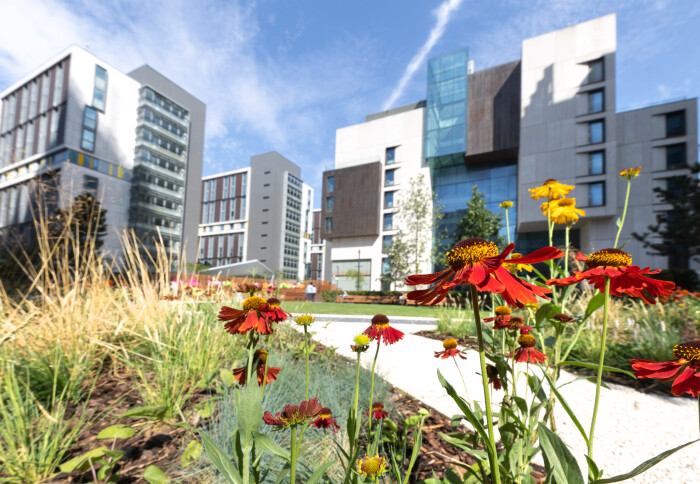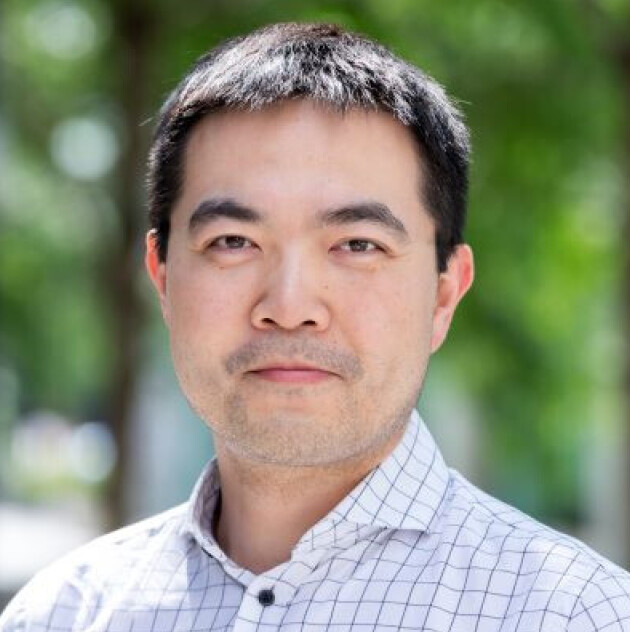Brain sciences celebrate academic promotions
by Meesha Patel

The 2024 round of academic promotions has seen five academics from the Department of Brain Sciences promoted.
Congratulations to Yu Ye and Nathan Skene who have been promoted to Senior Lecturer. Congratulations also to Javier Alegre Abarrategui who has been promoted to Clinical Reader and finally, congratulations to Soma Banerjee and Sofia Pappa who have been promoted to Professor of Practice.
We caught up with our newly promoted academics to find out about their research and how they feel about their promotion.
Yu Ye – Senior Lecturer in Molecular Neuroscience

Although my first degree from Imperial was BSc Biotechnology, I’d say my academic background is in Molecular Biology. I gained my PhD from MRC-LMB and then held a Junior Research Fellowship at Cambridge. I subsequently secured a Sir Henry Wellcome Research Fellowship, with Professor Sir David Klenerman FRS at Cambridge and Professor Daniel Finley at Harvard. This enabled me to build my career in molecular dementia research. I returned to Imperial with a Fellowship from the UK DRI at the start of the pandemic where we were one of the first groups to work in the Sir Michael Uren Hub. Since 2023 my lab has been supported by various funders and I have been fortunate to have been supported by great mentors at various stages of my career who have shaped my background and character.
My lab is currently investigating the cellular degradation processes with advanced imaging systems and how their dysfunction is associated with certain neurodegenerative disorders. Building on our recent PNAS paper, we are now studying how the toxic proteins may be cleared to impede neurodegeneration. I also spend a portion of my time mentoring new students and last year I tutored 43 students; something I really benefitted from myself as an Imperial student and that I enjoy doing.
I am really excited to have been promoted and feel recognised for my contributions and the progress my team and I have achieved. I aspire to continue contributing to shaping our department and supporting putting Imperial Values into practice.
Nathan Skene – Senior Lecturer and group leader at UKDRI
 I studied computer science as an undergraduate (specifically, Artificial Intelligence and Cybernetics). But my intention was always to get involved in brain research. Along the way I realised that our best hope of understanding the brain is to use human genetic variation, to find biological mechanisms that drive differences between people and species. That led me to what I work on now.
I studied computer science as an undergraduate (specifically, Artificial Intelligence and Cybernetics). But my intention was always to get involved in brain research. Along the way I realised that our best hope of understanding the brain is to use human genetic variation, to find biological mechanisms that drive differences between people and species. That led me to what I work on now.
Genetics has advanced rapidly over the past few years. We now know a great deal about the regions of the genome that cause all kinds of things---from whether we drink wine, to our risk of Alzheimer’s. A major focus of my work has been on using genetics to determine the cell types which underlie brain traits. The great challenge is now figuring out what changes within these cell types are driven by genetics. We’re tackling this both on the experimental front and the computational front.
The department has really grown its strengths in genomics over the time I have been here. One of the exciting things for me over the past years has been to develop a wider network across the broader Imperial community: with the maths, and computer science department etc. Just the other day I was thrilled to discover a researcher in Chemistry, whose research is a perfect match for one of our projects. So, I feel that the promotion is a reflection of growing into the role and growing into a member of the wider Imperial community. And as has happened within the department, where we’ve formed an interconnected web of collaborations, I’m looking forward to forming stronger connections around the university, tying together teams of interdisciplinary workers towards solving major scientific challenges.
Javier Alegre Abarrategui – Reader in Neuropathology
 I studied Medicine and trained in Neurology in Spain. During my incipient research career in this period, I was involved in the discovery of the alpha-synuclein E46K mutation in Parkinson’s disease. I then moved to Oxford, where I pursued a DPhil in Human Molecular Genetics, followed by a postdoctoral position and Career Development Fellowship. I then entered the Diagnostic Neuropathology training programme, becoming a Royal College of Pathologist Fellow by examination. During this period, I developed the alpha-synuclein (AS) proximity ligation assay (PLA) to label AS oligomers in situ. In 2018, I was appointed Consultant Neuropathologist and Senior Clinical Lecturer at Imperial and Director of Neuropathology of The MS and Parkinson's Tissue Bank at Imperial.
I studied Medicine and trained in Neurology in Spain. During my incipient research career in this period, I was involved in the discovery of the alpha-synuclein E46K mutation in Parkinson’s disease. I then moved to Oxford, where I pursued a DPhil in Human Molecular Genetics, followed by a postdoctoral position and Career Development Fellowship. I then entered the Diagnostic Neuropathology training programme, becoming a Royal College of Pathologist Fellow by examination. During this period, I developed the alpha-synuclein (AS) proximity ligation assay (PLA) to label AS oligomers in situ. In 2018, I was appointed Consultant Neuropathologist and Senior Clinical Lecturer at Imperial and Director of Neuropathology of The MS and Parkinson's Tissue Bank at Imperial.
My current research continues to have a focus on dissecting the mechanisms associated to the early aggregation stages of tau and alpha-synuclein causing Alzheimer’s and Parkinson’s pathologies, both at the levels of developing novel methods for the detection of early toxic species (e.g. tau-PLA) as well as the study of the cellular alterations involved, to discover pathways and targets suitable for therapeutic interventions. I am the neuropathology lead for the Landmark study, a multimillion award led by Prof Johnson aimed at generating unique single cell type genomic datasets from high quality donated brain samples to advance our knowledge of the causes and progression of Parkinson’s disease and accelerate drug development. In addition, we have made a whole-body atlas of the cellular tropism of SARS-CoV2. Upon our discovery of the presence of SARS-CoV2 in enteric neurons, which are affected early Parkinson’s, we are also exploring how viral and environmental factors could trigger disease in the enteric nervous system.
The award of this Readership in Neuropathology gives me a feeling of satisfaction and pride, as it is a recognition of my achievements and growing reputation, and a sense of increased responsibility but also, I feel stimulated to continue working within this great institution alongside my colleagues towards uncovering new avenues of knowledge.
Sofia Pappa - Professor of Practice in Psychiatry
 I studied medicine in my native Greece and went on to train in both Neurology and Psychiatry, which, albeit unusual, was mostly driven by my curiosity about the brain-mind nexus and by my desire for a more holistic understanding of their complex interface with the internal (i.e. the body) and the external environment (i.e. our physical world and social realities). This was followed by a scholarship for a PhD in neuropsychopharmacology and a postdoctoral fellowship in neuropsychiatry at the Institute of Psychiatry, Kings College London. I joined West London Trust as a Consultant Psychiatrist in 2006 and have since held a number of senior clinical and research positions including Clinical Lead for adult mental health services (2009-2012), Mood & Psychosis Research Lead (since 2016), Specialty Research Lead in Mental Health for the National Institute for Health Research (NIHR, since 2017) and Honorary Senior Lecturer at the Department of Brain Sciences at Imperial (since 2013).
I studied medicine in my native Greece and went on to train in both Neurology and Psychiatry, which, albeit unusual, was mostly driven by my curiosity about the brain-mind nexus and by my desire for a more holistic understanding of their complex interface with the internal (i.e. the body) and the external environment (i.e. our physical world and social realities). This was followed by a scholarship for a PhD in neuropsychopharmacology and a postdoctoral fellowship in neuropsychiatry at the Institute of Psychiatry, Kings College London. I joined West London Trust as a Consultant Psychiatrist in 2006 and have since held a number of senior clinical and research positions including Clinical Lead for adult mental health services (2009-2012), Mood & Psychosis Research Lead (since 2016), Specialty Research Lead in Mental Health for the National Institute for Health Research (NIHR, since 2017) and Honorary Senior Lecturer at the Department of Brain Sciences at Imperial (since 2013).
I always understood my clinical research and academic activities as part of being a (or becoming a better) physician. My special interests centre around psychopharmacology and novel treatments in the management of psychotic and affective disorders from clinical trials to real world effectiveness as well as neuropsychiatry. Since, 2022, I am the founder and Academic Lead of the Trust’s innovative Neuromodulation Service offering and evaluating a number of interventions targeting neural circuits such as TMS, ECT, tDSC, rapid-acting antidepressant etc.
I am very excited to have been promoted to Professor of Practice, the first psychiatrist to have been awarded this prestigious title by the College. It is, indeed, a great honour to be recognised in this way by Imperial College London, one of the world’s leading institutions. It is also a testament, I believe, to the increasing importance of mental health in our wider ecosystem alongside the need to enhance clinical academic pathways. I hope this promotion will further strengthen the links between Imperial and West London NHS Trust, and ultimately improve the care we can offer people in north west London and beyond.
Article text (excluding photos or graphics) © Imperial College London.
Photos and graphics subject to third party copyright used with permission or © Imperial College London.
Reporter
Meesha Patel
Faculty of Medicine Centre